童金房Unit8 (The 2nd period)
翻译---中青版典范英语第8级第3册《博莎的秘密招数》
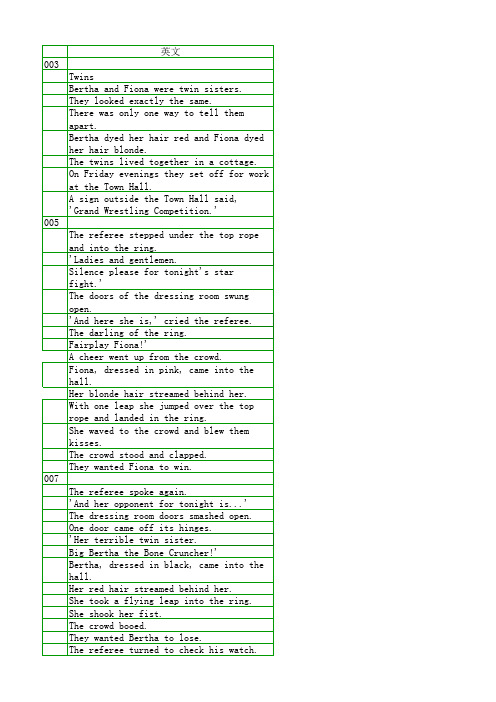
Fiona tapped on the door. 'Hurry up in there,' she called. 'Nearly finished,' replied Bertha. 'I must colour my hair before I go jogging,' said Fiona. Bertha came out of the bathroom. She had a towel wrapped around her head. 'I feel much better,' said Bertha. 'I've left the bathroom tidy.' 'Look at the time,' said Fiona. 'I shall be late.' Fiona dashed into the bathroom. She splashed on her hair colour. She was in such a hurry that she did not look in the mirror. 'Have a lovely run,' said Bertha. 019 Fiona jogged down the road. She ran through the park. Fiona saw a little kitten sitting on a wall. 'Hello, little kitty.' She stretched out to stroke the kitten. The kitten ran up a tree. A policeman was passing by. 'I saw you frighten that kitten. What an unkind thing to do.' 'I only tried to stroke it,' mumbled Fiona. She jogged on towards the playground. Some children were playing on the swings. 'Would you like a push?' she called. The children took one look at Fiona. They jumped off the swings and ran away. The park keeper raced up. 'What do you think you are doing? You were chasing those children. Go and chase someone your own size.' Fiona ran off. 021 Fiona stopped for a rest outside the supermarket. An old lady was pushing her trolley towards the door. Fiona ran over to help. She held open the door. 'After you,' she said. 'It's a trick.
儿科重症监护病房管理
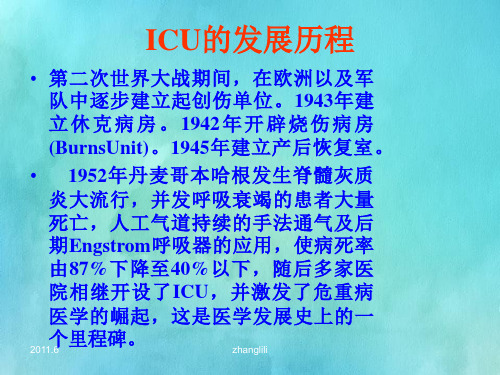
2011.6
zhanglili
ICU的发展历程
• 1980年在日本和菲律宾成立了西太 平洋危重病医学会
• 1982年欧洲成立了欧洲危重病医
学会。并对危重病医学所涉及各种
复杂临床病症,如脓毒症
(Sepsis)、多器官功能障碍综合
征(MODS)等,从基础到临床,
提出了一些新认识和可行的干预措
施。这些都标志着危重病医学作为
• (2)中间护理区:又称恢复区,当危重新生儿经抢 救好转后转入本室继续治疗。
• (3)辅助房间包括医、护办公室、治疗室、仪器室、
2011家.6 属接待室等。
zhanglili
儿科重症监护特点
NICU工作常规
• 应做到床头交接班,详细交待诊断、 病情、治疗及护理要点
• 入院前准备 预热暖箱,检查抢救单元 设备和功能,保证完好。
2011.6
zhanglili
重症监护内容介绍
• 各专科重症监护病房则收治各专科内危重患者, 如心肌梗死收入冠心病重症监护病房 ;新生儿 重症监护病房(NICU)
• 重症监护病房的监测范围很广泛,可按呼吸、循 环、肝、脑、肾、胃肠、血液及凝血机制、内分 泌、水电解质、给氧等几大系统划分。常用监测 项目有心电图、心功能、血压、呼吸频率及节律 和型式、体温、尿量、动脉血气分析、脑电图等 20多项,并根据病情的危重程度将监测的范围分 为3级,特殊监护患者用一级监测,疾病和手术 后可能有致命危险的患者用二级监测,病情趋于 平稳者用三级监护。
• 美国ICU 床位约占全院总床位数的2 % ~4 % 。北 京儿童医院目前拥有PICU、NICU( 新生儿ICU) 和 CCU( 心脏ICU) ,ICU 床位数约占全院总床位数的
2022-2023学年小学英语五下Unit 7-Unit8知识点讲解+练习(译林版三起)

2022-2023学年小学英语五下Unit7-Unit8知识点讲解+练习(译林版三起)Unit7 Chinese festivals【四会单词】1.festival 节日2.Spring Festival 春节3. January 一月4. February 二月5. call 叫作,称作6. Chinese New Year 中国农历新年7. get together 团聚 8. dumpling 饺子9. Dragon Boat Festival 端午节10. May 五月11. June 六月 12. dragon boat race龙舟比赛;赛龙舟13. place 地方,地点 14. rice dumplings粽子15. Mid-Autumn Festival中秋节 16. September 九月17. October 十月 18. moon cake 月饼19. Double Ninth Festival 重阳节 20. November十一月21. old 老的,年纪大的 22. mountain 山,山脉23. rice cake 重阳糕24. Mother’s Day母亲节快乐25. Father’s Day父亲节 26. favourite 最喜欢的【词组短语】1.Spring Festival 春节2.in January or February 在一月或二月3.Chinese New Year中国农历新年4.get together团聚5.eat dumplings 吃饺子6.Dragon Boat Festival 端午节7.dragon boat races龙舟比赛;赛龙舟8.eat rice dumplings吃粽子9.at this festival 在这个节日10.Mid-Autumn Festival中秋节11.in September在九月份12.at night在夜晚13.eat moon cakes吃月饼14.Double Ninth Festival 重阳节15.old people老人16.climb mountains爬山17.eat rice cakes吃重阳糕18.on the second Sunday在第二个星期日19.on the second Sunday of May 在五月的第二个星期天20.on Mother’s Day在母亲节21.all festivals 所有的节日22.give…presents给…礼物23.talk about 谈论24.some flowers一些花25.Happy Mother’s Day母亲节快乐26.Father’s Day父亲节27.a day for mothers 妈妈的节日28.dress up乔装打扮29.in the tree 在树上(外来物)30.on the thirty-first of October 在10月31日31.knock on the door 敲门32.trick or treat 不给糖就捣乱33.eat a lot 吃很多34.have a big dinner 吃一顿丰盛的晚餐35.look at the moon 赏月36.get together with families 和家人团聚在一起37.in some places 在一些地方38.look at the moon 看着月亮,赏月39.visit their parents 拜见父母40.a festival for old people 老年人的节日【句型】1. The Spring Festival is in January or February. People also call it Chinese New Year.春节在一月或二月,人们也称它为中国新年。
Unit8Abumpinthenight(课件)-新概念英语青少版1A
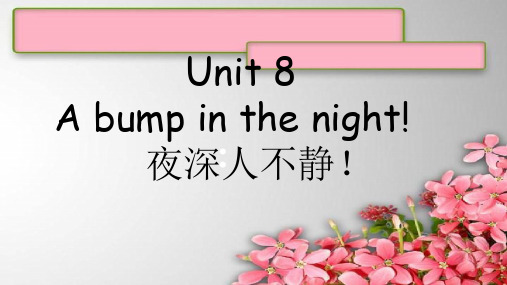
Thank you
No harm done!
all和both的区别:
all指三者或三者以上。 both指两者。 用法:位置放在be动词的后面
eg:Peter and I are both students. e.g.We are all here.
/k/ wake kitchen careful key basket camera thanks doctor /g/ girl give big burglar green grey gate photographer
6.桌子上有一根香蕉。 7.沙发上有一只猫。 8.房间里有一只狗。 9.院子里有一颗树。
There is an apple on the desk.
否定句: There isn’t an apple on the desk. 否定句变化规则: 一找 (is) 二加 (is后加not)
There is an apple on the desk.
序数词
first (1st) 第一 third (3rd) 第三 fifth (5th) 第五 seventh (7th) 第七 ninth (9th) 第九
second (2nd) 第二 fourth (4th) 第四 sixth (6th) 第六 eighth (8th) 第八 tenth (10th) 第十
Please be careful! Willianm:Shh!
There is someone downstairs.
be careful 小心
givth to sb eg: I give Anna a book=I give a book to
一般疑问句:
Is there an apple on the desk?
剑桥少儿下unit8(2nd)教案

S1:I want this blue balloon,please.
T: And you?
S2: I want that yellow parrot,please.
T: What about this red one? Do you wantit, Linda?
Teaching explanation
Teaching Contents
Unit8 Our colour fair
(Cambridge young learners English)
Teaching Time
Students
剑桥少儿英语第一级下册
Teaching Aids
ppt
Teaching Objectives
(Justification:This step will help ss remember the sentences well.)
Step 6Summary and homework(5mins)
Summary: Do the summary together with the students.
Teaching objectives : Ss can review the words about colors and know how todescribe them.
Ability objectives: Ss could master how to express the colours about the things surrounding.
Teaching Approach
Inducing-mode teaching
Unit8 When is your birthday SectionA 七年级上英语课件(人教版)

D. May
5. — _____ is Lucy’s birthday? —It is on May 2nd.
A. What
B. When
C. Where
D. Who
Exercise 二、句型转换。
1. Helen’s birthday is on November 26th. (对画线部分提问) When is Helen’s birthday?
A:When is Alice’s birthday? B:Her birthday is on September 5th. A:When is your father’s birthday? B:HAilsicbe’isr是thAdlaicye i的s 名on词_所_有__格_形__式. ,意为
复数名词一般在词尾加“ ’s”。 eg: Kate’s cat 凯特的猫 Children’s Day 儿童节
Language points
(2) 名词后加“ ’s” 表示所有, 意为“……的”。 eg: This is Tom’s book. 这是汤姆的书。 以s结尾的复数名词只在词尾加“ ’ ”。 eg:the students’ book 学生用书
—Oh, yes.
Lead in
December January February
March April
November
twelve months
October September
August
July June May
Presentation
How many days are there in each month?
11th eleventh 12th twelfth 13th thirteenth
最新人教版英语七年级Unit8_When_is_your_birthday_SectionB

Joe: OK, and when is the basketball game?
Sally: The basketball game? Oh, it’s_O_c_to_b_er_2_n_d___.
Joe: Good. And, um, how about the school trip?
Sally: The school trip is S__e_p_te_m__b_e_r_2_6_t_h___ and 2_7_t_h___.
Eric has a good time there every day. =Eric has fun there every day. =Eric enjoys himself there every day.
埃里克在那里每天过得都很愉快。
Homew ork
1. Remember all the new words and expressions.
Role-play the conversations in 3b.
A: How old are you, Grace? B: I’m twelve. A: And when is your birthday? B: My birthday is on March 12th. How
about you and Tom? A: Well, my birthday is on July 5th, and
Dates
September 21st October 12th
October 15th October 22nd
November 3rd November 30th December 3rd
Activities
school trip soccer game volleyball game school day art festival English party book sale
人教新目标 七年级上册英语 Unit8语法知识梳理

Unit8语法知识讲解1.序数词要加定冠词the。
但当序数词前有物主代词(his, her…)、指示代词(this, that…)等修饰时,则不必再用the。
如:on the third floor 在三楼on his twelfth birthday 在他十二岁生日这天2.序数词常用缩写形式,即“阿拉伯数字+个位序数词的后两个字母”。
如:one →1st; second→2nd; third→3rd; twelfth→12th; twenty-sixth →26th3. 序数词可表示日期“几月几日”中的“几日”。
如:August 17th 8月17日October 1st 14. 读序数词表,然后写出下列基数词的序数词。
one ______ two ________ three _________ five ________ eight _______ nine __________ twelve _______ fifteen _______ eighteen ________ twenty __________ twenty-one _______________ twenty-two ______________5.when是疑问副词,意为“什么时候;何时”,常见结构为“When + be/助动词+主语(+其他)?”用来询问时间,既可询问某个时段或时刻,也可询问具体的日期。
如:—When is the football match? 足球比赛在什么时候?—It’s September 15th. 在九月15号。
—When do you watch TV? 你什么时候看电视?—At eight o’clock. 在八点钟。
6.October 2nd(10月2日)是日期的表达法。
表达具体日期通常为“月份+序数词”,月份为专有名词,首字母必须大写如:6月8日June 8th 8月3日August 3rd[拓展]英语中表示具体年、月、日的方式通常有两种:“月+日+年”或“日+月+年”。
五年级下学期 Unit 8 The concert ( Lesson 2)教案

五年级下学期 Unit 8 The nert ( Lessn2)教案五年级下学期Unit8Thenert教案(一)指导思想与理论依据《英语程标准》中明确指出,基础教育阶段英语程的任务之一是:激发和培养学生学习英语的兴趣,使学生树立自信心,养成良好的学习习惯和形成有效的学习方法,发挥自主学习的能力和合作精神,使学生掌握一定的语言综合运用能力,倡导体验、实践、参与、合作与交流的学习方式和任务型的教学途径,培养学生跨文化交际意识。
在小学英语词汇教学中,要遵守直观性原则、增强词汇教学的趣味性、利用语境,让学生理解并掌握词汇,注重学生学习单词的过程,渗透总结、归纳单词规律的方法,培养学生的观察能力。
(二)教学背景分析、教学内容分析本节是先锋版英语第八册(五年级下学期)第八单元第二时,词汇教学。
在整套教材中,乐器类词汇在一二年级中作为语音词出现了:vilin\flute,六年级复习时,要求学生能写出同类词。
本单元中第一时,出现了pian,nert,prgra,drus,guitar,start,ill,本节在复习上述词汇后,重点学习nert,vilin,pian,drus,guitar,flute,词组plathepian2、学情分析(1)五年级学生的学习兴趣较低年级有所降低,因此要用有趣有效的活动来激发他们的学习兴趣。
(2)学生已经有了五年的英语学习经验,已经有了一定总结归纳的经验。
学生在一至三年级参与攀登英语实验,表达表演能力很强。
(3)学生之间存在差异,因此强调在小组活动中要互相帮助。
3、教学方法、手段分析(1)直观单词教学法(2)小组合作学习4、技术准备教学,交互式白板(三)教学目标、能听说认读,初步记忆单词:nert,vilin,pian,drus,guitar,flute,词组plathepian能理解usi,prgra2、能在小组合作的情况下能创编小短文。
3、鼓励学生培养广泛的兴趣爱好。
(四)教学过程与教学资源设计Ⅰ、arup8’、Greeting(1)hatdaisittda?H’stheeatherlietda?Freetal2、背景音乐(各种乐器演奏的音乐):hatinstruentisit?引出:pian,drus,guitar,flute,vilinT:TheNetnshlillhaveanertnhildren’sdahillplathepian/drus/guitar?Ⅱ、Presentatin学习新单词。
牛津译林版三下英语Unit8__单元重点归纳公开课教案课件公开课教案课件
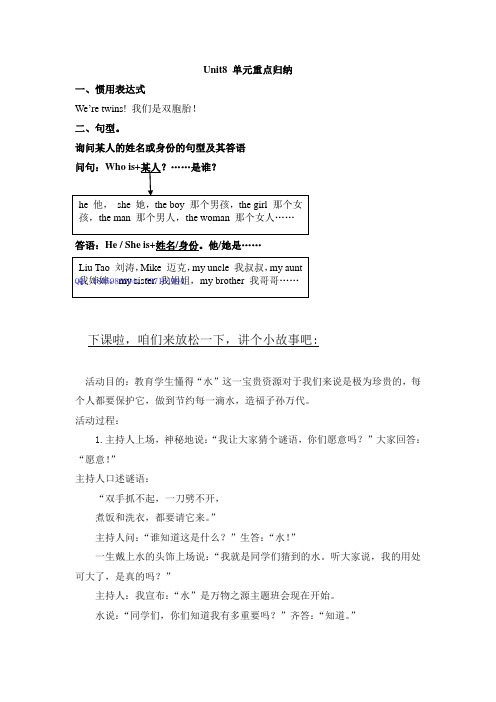
Unit8 单元重点归纳一、惯用表达式We ’re twins! 我们是双胞胎!二、句型。
询问某人的姓名或身份的句型及其答语答语:He / She is+姓名/身份。
他/她是……QQ :1805986694,597161994活动目的:教育学生懂得“水”这一宝贵资源对于我们来说是极为珍贵的,每个人都要保护它,做到节约每一滴水,造福子孙万代。
活动过程:1.主持人上场,神秘地说:“我让大家猜个谜语,你们愿意吗?”大家回答:“愿意!”主持人口述谜语:“双手抓不起,一刀劈不开,煮饭和洗衣,都要请它来。
”主持人问:“谁知道这是什么?”生答:“水!”一生戴上水的头饰上场说:“我就是同学们猜到的水。
听大家说,我的用处可大了,是真的吗?”主持人:我宣布:“水”是万物之源主题班会现在开始。
水说:“同学们,你们知道我有多重要吗?”齐答:“知道。
”Liu Tao 刘涛,Mike 迈克,my uncle 我叔叔,my aunt我婶婶,my sister 我姐姐,my brother 我哥哥……甲:如果没有水,我们人类就无法生存。
小熊说:我们动物可喜欢你了,没有水我们会死掉的。
花说:我们花草树木更喜欢和你做朋友,没有水,我们早就枯死了,就不能为美化环境做贡献了。
主持人:下面请听快板《水的用处真叫大》竹板一敲来说话,水的用处真叫大;洗衣服,洗碗筷,洗脸洗手又洗脚,煮饭洗菜又沏茶,生活处处离不开它。
栽小树,种庄稼,农民伯伯把它夸;鱼儿河马大对虾,日日夜夜不离它;采煤发电要靠它,京城美化更要它。
主持人:同学们,听完了这个快板,你们说水的用处大不大?甲说:看了他们的快板表演,我知道日常生活种离不了水。
乙说:看了表演后,我知道水对庄稼、植物是非常重要的。
丙说:我还知道水对美化城市起很大作用。
2.主持人:水有这么多用处,你们该怎样做呢?(1)(生):我要节约用水,保护水源。
(2)(生):我以前把水壶剩的水随便就到掉很不对,以后我一定把喝剩下的水倒在盆里洗手用。
UNIT8GRAMMARFOCUS3A3C课件人教版七年级英语上册

a. No, it's on the 6th. b. Her birthday is on May
24th.
c. Yes, it is.
d. Their birthdays are in January.
e. It's on June 16th.
3b Complete the conversation and practice it with your partner.
Let’s talk
When is _y_o_u_r birthday?
My birthday is _o_n__May 2nd.
You 5月2日
Let’s talk
George’s When is _h_i_s_
birthday?
1月17日
His birthday is _o_n__ January 17th.
B.ten; ten
C. tenth; ten
D. tenth; tenth
Exercises
句型转换,每空一词
(2)Kathy and I are both 13 years old. (就画线部分提问) _H__o_w__ ___o_ld____ _a_r_e___ __y_o_u____.
(3)What is your age? (改为同义句) _H__o_w___ ___o_ld___ __a_r_e___ you?
UNIT 8
When is your birthday?
Section A Grammar Focus 3a-3c
Let’s Play a game
_W__h_e_n_ is your birthday?
Let’s talk
Unit8 Section B (2a-2c) 22-23学年人教版英语七年级上册

4.They have an art festival in
November. T 5.It’s naobt uasbyutseyrmterm. F
This is a really ______ term! Have a good time!
Dates
September 21st
October 12th October 15th October 22nd November 3rd November 30th December 3rd
Activities
Fast reading Underline the dates(日期)
CarefuPrlesreenatadtiionng
Task 3 Read and judge.
Read the passage carefully and judge “T” or “F”.
1.The students have a school trip on
(3) 表示几者共同拥有时,只须在最后一个 名词后加“’s”;若表示各自所有,则必 须在各个名词后加“’s”。如: This is Tom and Lucy’s room. 这是汤姆和露西共有的房间。 These are Tom’s and Lucy’s rooms. 这些是汤姆和露西各自的房间。
(4) 表示无生命事物的名词所有格需要借助介词of来
— This afternoon.
birthday.
Exercise
教材梳理:七上Unit8知识点+练习(含答案)

Unit 8 When is your birthday?重点词汇:第一部分:词汇精讲1. in, on, at表示时间的介词in ,on 与at的基本区别:in 后常跟年,月,季节,周等,也用于表示泛指的上午,下午,晚上。
例如:in summer 在夏季in the morning 在上午in July 在七月We often plant trees in spring. 我们经常在春季植树。
My father often goes to Beijing in January.我的爸爸经常在一月去北京。
on 后常跟具体的某一天,或者跟表示某一天的上午,下午,晚上等的词。
例如:on Saturday 在星期六We are very happy on Children’s Day. 儿童节那天我们很开心。
at后常跟某个具体的时刻点。
例如:at 7:00 在七点钟at the moment 在此刻2. when adv.什么时候,何时when 意为“何时,哪一天”,是疑问副词。
引导特殊疑问句,用来提问时间。
例如:When do you go to school every day? 你们每天几点去上学?拓展:When&What time3. birthday n. 生日【词汇记忆】birth( n. 出生、诞生)+day(天)→出生的那天就是生日(birthday)birthday 意为“生日”,birth( n. 出生、诞生)+day(天)→出生的那天就是生日(birthday)常见的这种合成词还有:news + paper→newspaper 报纸bed + room→bedroom 卧室class + room →classroom 教室head + phone →headphone 耳机police + man→policeman 警察basket + ball→basketball 篮球birthday常见的相关词组:birthday present生日礼物birthday party 生日聚会birthday cake 生日蛋糕birthday candle 生日蜡烛【即学即练】汉译英妈妈给我买了一个生日礼物。
Unit8Anouting知识点讲解精选精练(讲义)沪教牛津版(深圳用)英语五年级上册

Unit 8 An outing知识点讲解重点短语精选精练一、单选题1.The cat is running _______ a mouse.()A.after B.next C.on 2.The stone looks _______ a monkey. ()A.likes B.is likes C.like 3.Let's _______ a story before bedtime. ()A.reading B.read C.reads 4.Look _______ the pictures. ()A.on B.in C.at5.Look at Jill. She is _______ a new coat.()A.wearing B.putting C.putting off 6.Look _______. There's a rabbit under the table. ()A.down B.at C.up7.There's a tall tree _______ the top of the hill. ()A.in B.for C.at8.Lucy can’t ________ through the door. ()A.get B.gets C.gettingA.swimming B.running C.reading 10.Peter _______ milk every day. ()A.is drinking B.drinks C.drink 11.Were you _______ Canada during the summer holiday? ()A.in B.at C.on12.Let's open the box _______ this key. ()A.and B.with C.use 13.—Are the Browns in Sanya? ()—_________ They are on holiday in Yunnan.A.Yes, they are.B.Sorry, I don’t know.C.No, they aren’t.A.at B.with C.in二、中英互译:单词/短语Sam: Good afternoon, Mum.Mum: Good afternoon, Sam.Sam: 20Mum: He's in the kitchen.Sam: 21Mum: No, he isn't. 22Sam: Where's my sister? Is she in the kitchen, too?Mum: No, she isn't. 23Sam: 24Mum: She's reading a book.A.Is he cooking dinner?B.He is washing the dishes.C.Where is my Dad?D.She is in her bedroom.E.What is she doing?四、阅读选择Wele to the Children's Centre. Happy Children's Day! You can do many things here. Look at these people. They're very active. This is Chen jie. She's drawing picrures. Mike is watching insects. Amy is reading a story book. Wu Yifan is playing chess with a man. Who's the man? He's Mr Black, Wu Yifan's math teacher. He's a smart man. John and Sarah are taking pictures. Where's Bai Ling? Look! She's over there, she's writing a report on the Children's Day. Her sister is singing and playing the piano.25.Is Bai Ling singing? ()A.Yes, she is.B.No, she isn't.26.What's Mike doing?()A.He's watching TV.B.He's watching insects.27.What's the date?()A.It's June 2nd.B.It's June 1st.28.What is Wu Yifan doing? ()A.He's playing chess.B.He's playing sports.29.What is Bai Ling doing in the Children's Centre? ()A.She's singing and playing the piano.B.She's writing a report.When spring es, everything begins to grow. The weather is warm and sunny. The treesturn green. The flowers bloom. They are very beautiful. And people begin to do exercise. Look! In the park, some old people are walking along the river. Some young people are running on the road. Some children are playing games under the big trees. They are very happy.30.Everything begins to grow when ________ es. ()A.spring B.winter C.fall31.In spring, the weather is _______ and sunny. ()A.cold B.warm C.cool32.Some old people are _______ along the river in the park.()A.walking B.running C.sleeping33.There are some young people _______ on the road. ()A.running B.walking C.talking34.What are the children doing?()A.They are playing word games.B.They are playing games.C.They are playing puter games.参考答案:1.A【详解】句意:猫正在追一只老鼠。
剑桥国际少儿英语第二版第八单元
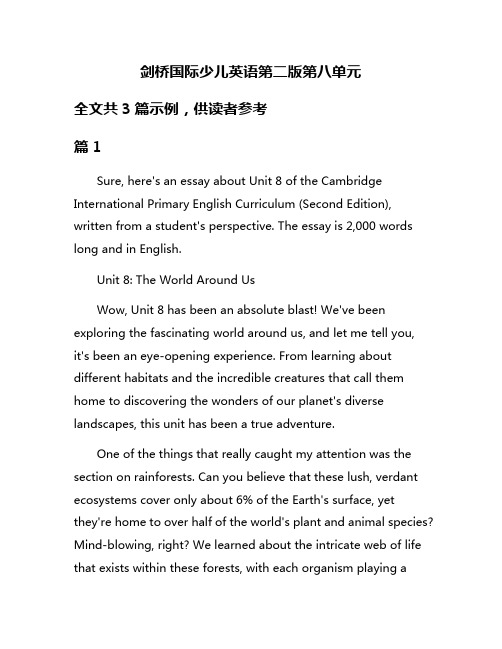
剑桥国际少儿英语第二版第八单元全文共3篇示例,供读者参考篇1Sure, here's an essay about Unit 8 of the Cambridge International Primary English Curriculum (Second Edition), written from a student's perspective. The essay is 2,000 words long and in English.Unit 8: The World Around UsWow, Unit 8 has been an absolute blast! We've been exploring the fascinating world around us, and let me tell you,it's been an eye-opening experience. From learning about different habitats and the incredible creatures that call them home to discovering the wonders of our planet's diverse landscapes, this unit has been a true adventure.One of the things that really caught my attention was the section on rainforests. Can you believe that these lush, verdant ecosystems cover only about 6% of the Earth's surface, yetthey're home to over half of the world's plant and animal species? Mind-blowing, right? We learned about the intricate web of life that exists within these forests, with each organism playing acrucial role in maintaining the delicate balance. It's almost like a giant, living puzzle, where every piece fits together perfectly.Speaking of puzzles, do you know what truly amazed me? The incredible adaptations that plants and animals have developed to survive in their unique environments. I mean, imagine having sticky pads on your feet to climb trees like a gecko or using echolocation like a bat to navigate in the dark! It's like nature has its own ingenious bag of tricks, and every creature has a special superpower to help them thrive.But it's not just the living things that captured my imagination; the landscapes we studied were equallyawe-inspiring. From the majestic peaks of towering mountains to the vast, expansive deserts, each environment has its own unique charm and challenges. I found myself daydreaming about scaling those snow-capped summits or exploring the rolling dunes of the Sahara. Who knows, maybe one day I'll be an adventurer, trekking through these incredible landscapes and witnessing their wonders firsthand!Of course, we couldn't ignore the pressing issue of environmental conservation. It was heartbreaking to learn about the threats facing many of these habitats and the species that call them home. Deforestation, pollution, and climate change areall taking a toll, and it's up to us to make a difference. I'm determined to do my part, whether it's reducing my carbon footprint, participating in cleanup efforts, or simply spreading awareness about the importance of protecting our planet's precious resources.But you know what really struck a chord with me? The realization that we, as humans, are an integral part of the world around us. We're not separate from nature; we're interconnected with it in ways we often overlook. Our actions have ripple effects that can either nurture or harm the delicate ecosystems we share this planet with. It's a sobering thought, but it also fills me with a sense of responsibility to be a better steward of our environment.As I reflect on all that I've learned in Unit 8, I can't help but feel a profound sense of awe and appreciation for the world around us. It's a tapestry of life, woven together with intricate threads of diversity, adaptation, and interconnectedness. And while there are certainly challenges we face in preserving this incredible tapestry, I'm filled with hope and determination to do my part in ensuring that future generations can marvel at its beauty and wonder, just as I have.So, here's to Unit 8 and the countless lessons it has imparted. May the knowledge we've gained inspire us to explore, appreciate, and protect the incredible world around us. After all, it's not just our planet; it's our home, and it's up to us to cherish and safeguard it for generations to come.篇2Cambridge English Course Unit 8 - My Thoughts and ExperiencesUnit 8 of the Cambridge International English course for young learners has been an engaging and insightful journey for me. This unit, titled "Stories People Tell," delved into the captivating world of storytelling, exploring various genres and the power of narratives to entertain, educate, and inspire.One of the aspects I found particularly fascinating was the exploration of different story types. We learned about traditional tales, fables, myths, and legends, each with its unique characteristics and cultural significance. The unit provided ample opportunities to analyze and discuss these stories, allowing us to appreciate the universal themes and morals they convey.Traditional tales, such as folktales and fairy tales, captured my imagination with their richly woven narratives andenchanting characters. I was enthralled by the adventures of heroic protagonists, the cunning wit of tricksters, and the magical elements that brought these stories to life. Learning about the oral traditions and the importance of passing down these tales from generation to generation instilled in me a newfound respect for cultural heritage.Fables, on the other hand, taught me valuable life lessons through the clever use of animal characters and metaphorical narratives. Aesop's fables, for instance, have left a lasting impression on me, as they conveyed profound truths about human nature, virtues, and the consequences of our actions in an engaging and memorable way.Myths and legends, with their grand tales of gods, heroes, and supernatural beings, opened my mind to the rich tapestry of belief systems and cultural narratives from around the world. I marveled at the creativity and symbolism embedded in these stories, which often explained natural phenomena or served as a means of preserving cultural identity and values.Throughout the unit, we engaged in various activities that fostered our understanding and appreciation of storytelling. We analyzed the structure and elements of stories, such as characters, settings, plots, and themes. We practiced retellingand summarizing stories, honing our comprehension and oral communication skills. Additionally, we had the opportunity to create our own narratives, allowing us to tap into our imaginative abilities and express ourselves creatively.One of the highlights of this unit was the storytelling project, where we worked in groups to research, adapt, and present a traditional tale from our respective cultures. This project not only strengthened our collaborative skills but also encouraged us to embrace and celebrate cultural diversity. Sharing and listening to stories from different parts of the world broadened our perspectives and fostered a sense of unity amidst diversity.Moreover, the unit emphasized the importance of storytelling as a means of preserving cultural heritage, transmitting values, and fostering social connections. We explored the role of storytellers in various communities and how narratives have been used to pass down wisdom, promote understanding, and bring people together across generations.Beyond the academic content, this unit also taught me invaluable life skills. It nurtured my creativity, critical thinking, and communication abilities. The interactive nature of the lessons encouraged active participation, collaborative learning,and respectful discourse, all of which are essential for personal growth and effective teamwork.In conclusion, Unit 8 of the Cambridge International English course for young learners has been a captivating and enriching experience. Through the exploration of stories and narratives, I have gained a deeper appreciation for cultural diversity, developed a love for storytelling, and honed important skills that will serve me well in my future endeavors. The lessons and activities have not only broadened my English language proficiency but have also instilled in me a greater sense of wonder, empathy, and curiosity about the world around me.篇3Unit 8: The Environment Around UsAs an inquisitive student, I eagerly dove into Unit 8 of our Cambridge International Primary English course, excited to explore the fascinating world of the environment around us. This unit proved to be an eye-opening journey, shedding light on the intricate web of life that sustains our planet and the crucial role we play in preserving its delicate balance.One of the first lessons that resonated with me was the concept of habitats. We learned that every living organism, fromthe mighty oak tree to the tiniest insect, requires a specific environment to thrive. These habitats provide the necessary resources for survival, such as food, water, shelter, and space. It was a humbling realization to understand that even the smallest disturbance in a habitat can have far-reaching consequences for the creatures that call it home.Our class discussions took an intriguing turn when we delved into the concept of food chains and food webs. I was captivated by the intricate relationships between producers, consumers, and decomposers, each playing a crucial role in maintaining the delicate balance of the ecosystem. We learned how energy flows through these interconnected systems, and how the loss of even a single species could disrupt the entire web of life.One of the most thought-provoking lessons revolved around the impact of human activities on the environment. We explored topics such as pollution, deforestation, and the overexploitation of natural resources. It was sobering to witness the devastating effects of our actions on fragile ecosystems, from the choking of marine life by plastic waste to the loss of biodiversity due to habitat destruction. However, this unit also instilled in me a sense of hope and empowerment, as wediscussed practical solutions and individual actions we could take to mitigate our environmental footprint.One particular activity that left a lasting impression was our class field trip to a local nature reserve. There, we had the opportunity to observe firsthand the richness of biodiversity and witness the intricate relationships between various species within their natural habitats. We learned about conservation efforts and the importance of preserving these precious ecosystems for future generations.Throughout the unit, we engaged in various hands-on activities and projects that brought the concepts to life. From creating miniature ecosystems in terrariums to conducting experiments on the impact of pollution, these interactive experiences solidified our understanding and fostered a deeper appreciation for the environment around us.As we neared the end of Unit 8, I couldn't help but reflect on the valuable lessons I had learned. The knowledge and insights gained have not only enriched my academic understanding but have also instilled in me a profound sense of responsibility towards our planet. I now recognize that every action, no matter how small, can have a ripple effect on the delicate balance of nature.Moving forward, I am determined to apply the principles and values I have learned in this unit to my daily life. Whether it's reducing my carbon footprint, participating in local conservation efforts, or simply being more mindful of my consumption habits, I am committed to being an active steward of our environment.In conclusion, Unit 8 of the Cambridge International Primary English course has been a transformative journey, igniting my curiosity and deepening my appreciation for the intricate tapestry of life that surrounds us. It has equipped me with the knowledge and tools to make informed decisions and take meaningful actions to preserve our planet for generations to come. As I continue my educational journey, I carry with me the invaluable lessons from this unit, forever etched in my mind as a reminder of our profound connection to the environment and our collective responsibility to protect it.。
英语人教PEP版七年级(上册)Unit8SectionA(2024版新教材)
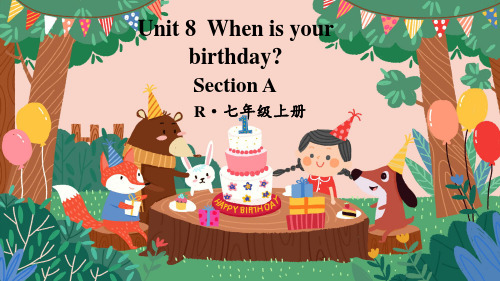
n.二月
讲解:
缩写形式:Feb. in February 在二月
例句: ◆ February is the second month of a year.
二月是一年的第二个月。 ◆ It’s a little cold in February.
adj.愉快的; 高兴的
讲解: 常在句中作定语或表语。 反义词为unhappy, 意为“不高兴的; 不快乐的”。
例句: ◆ The happy boy in the picture is me.
照片里那个快乐的男孩是我。
生日快乐
讲解:是常用来祝福对方生日快乐的交际用语,其后可接“to +祝福的对象”。答语常为“Thank you./Thanks.”。 happy还可用于节假日之前,表示祝福。
二月天气有点冷。
n.三月
讲解:缩写形式:Mar. in March 在三月
例句:◆ March is the third month of a year. 三月是一年的第三个月。
拓展:march 作动词,意为“行军;前进” ◆ The soldiers are marching towards the camp. 士兵正朝着营地前进。
拓展:
The Party’s Day is on July 1st. 建党节在七月一号。
n.八月
讲解: 缩写形式:Aug. in August 在八月 例句: ◆ The autumn comes in late August.
秋天在八月末到来。 拓展:
The Mid-Autumn Festival is on August 15th in Chinese lunar calendar. 中秋节是在中国的农历八月十五。
Unit8Abumpinthenight!(讲义)新概念英语青少版1A
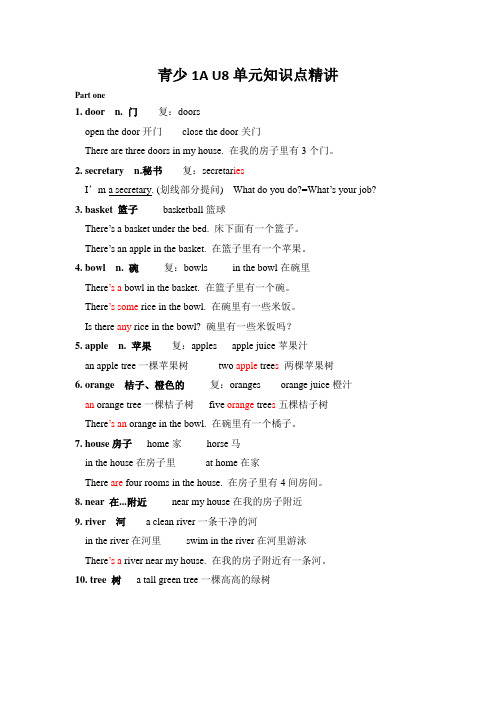
青少1A U8单元知识点精讲Part one1. door n. 门复:doorsopen the door开门close the door关门There are three doors in my house. 在我的房子里有3个门。
2. secretary n.秘书复:secretar iesI’m a secretary. (划线部分提问) What do you do?=What’s your job?3. basket 篮子basketball篮球There’s a basket under the bed. 床下面有一个篮子。
There’s an apple in the basket. 在篮子里有一个苹果。
4. bowl n. 碗复:bowls in the bowl在碗里There’s a bowl in the basket. 在篮子里有一个碗。
There’s some rice in the bowl. 在碗里有一些米饭。
Is there any rice in the bowl? 碗里有一些米饭吗?5. apple n. 苹果复:apples apple juice苹果汁an apple tree一棵苹果树two apple tree s两棵苹果树6. orange 桔子、橙色的复:oranges orange juice橙汁an orange tree一棵桔子树five orange tree s五棵桔子树There’s an orange in the bowl. 在碗里有一个橘子。
7. house房子home家horse马in the house在房子里at home在家There are four rooms in the house. 在房子里有4间房间。
8. near 在...附近near my house在我的房子附近9. river 河 a clean river一条干净的河in the river在河里swim in the river在河里游泳There’s a river near my house. 在我的房子附近有一条河。
Unit8We'retwins!课件
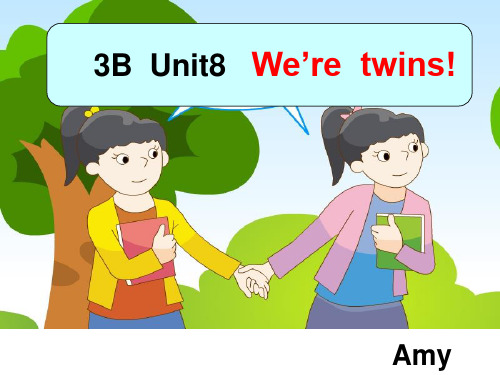
第三关 Let’s guess. Work in pairs 同桌练习
A: Who’s he? B: He’s…
用下面的句子与同桌 问答,来猜猜他们是谁吧!
A: Who’s she? B: She’s…
第四关
Story time
Who are they ?
今天是学校的开放日,看图,和你的同桌谈论一下他们是谁?
和表情!
4
5
●语音正确、声音响亮、说得流畅。 ●语音正确、声音响亮、说得流畅、
语调准确。 ●语调正确、声音响亮、说得流畅、
语调准确、动作表情到位。
温馨提示: 好朋友要相互帮助哦!
Let’s show !
欢迎来到双胞胎聚会
闯关成功
Let’s imagine. 双胞胎聚会上,我们遇到了 Su Hai 和Su Yang 的家人
3B Unit8 We’re twins!
Amy
We’re twins
海报:如果闯关成功,可以参加双 胞胎家庭聚会,认识他们的家人和
朋友,你们想试试吗?
第一关
Let’s sing
第二关 Let’s play
Brain Storming
30-Second Non-Stop Talking
游戏规则: 六人一组,每人轮流说出 关于家庭成员的单词,不 许重复。时间三十秒。
备。 3.看看哪个小组 想象力最丰富, 表演得最好哦!
想一想: 我们 会和他们说 什么、做什么呢?
Let’s act.
让我们把遇到Su Hai和Su Yang 家人的情景演一演吧!
Hello/Hi. Who’s he? Who’s she?
He’s… She’s my… This is my… Nice to meet you.
unit 8-Two-Boxes-of-Gold

Pagliavicini and Rossi, No. 172 Toledo, Naples那
不勒斯
Scene 1: conversation between Mr. Schwarzmoor and Blamyre
The most famous quote: “The truth is always only
one!”
Detective in the history
Bao Zheng (999-1062), commonly known as Bao Gong, was a much-praised official who served during Northern Song Dynasty.
Unit 8 Two Boxes of Gold (Ⅰ)
(P 121)
Reading Comprehension
I. Read the introduction part and catch the key information.
Reading Comprehension
II. Reading & Thinking Read through the passage in 20
Focus training
Finish the exercises on page 130.
Fast Reading
Finish the exercises in Fast Reading in 12 minutes.
Thank You
vocabulary:
I. Finish exercise C on p127; II. Look up the new words in the
- 1、下载文档前请自行甄别文档内容的完整性,平台不提供额外的编辑、内容补充、找答案等附加服务。
- 2、"仅部分预览"的文档,不可在线预览部分如存在完整性等问题,可反馈申请退款(可完整预览的文档不适用该条件!)。
- 3、如文档侵犯您的权益,请联系客服反馈,我们会尽快为您处理(人工客服工作时间:9:00-18:30)。
Step3Feed backRetell the articlel:
Being a volunteer is great!Number 77 High School is home to three very _______ young people: Li Huiping,LanPei,and Zhu Ming. These three students all _______ their time to help other people.This volunteer work takes each of them _______ ______ a week, so it is a _____ __________ . Huiping loves to read, and she puts this love to good use by working in the __________ ______ ________at her local ____________ school.Here, she helps young children to read.Peiloves ________, and plans to study to be a ___________when he leaves school. He spends every Saturday morning ________in an animal hospital. Ming wants to be a ___________ ________. He sings for groups of people at the city hospital to _____ _____ ______. “Volunteering is great!” says Huiping. “_____ _____ do I feel good about helping other people, ____I get to spend time doing what I love to do.”Peisays he has learned more about animals. Ming says he has met some wonderful people at the hospital. The three students plan to _____ _____a student volunteer project “Become a volunteer today!”
Step4Develop to Check
1). We want some ________ to help pair the house.
A. volunteer B. volunteers
C. volunteered D. volunteering
2).Not only _____ teach in school but also ______novels.
5.兽医院_____________________ 6.不但…而且________________________
7.小学_______________________ 8.课后关爱中心
9.加入学校志愿工程_________________________________
10.训练一只足球队____________________________________
教学反思
A. did he; wrote he B. he did; wrote he
C. he did; he wrote D. did he; he wrote
3). _____ Tom _____ Mikewent to the park, but I didn’t.
A. Either; orB. Neither; nor
初三年级英语科阅读训练学案Don’t let yesterday use up too much of today.主备:童金房时间:11月23日
学习内容:Unit8 I’ll help clean up tห้องสมุดไป่ตู้e city parks.(The2ndperiod)
教学设计
Task2:Read the articlecarefully,then talk aboutthe questions.
1) Do you think volunteering is great?
2) What could you do if you are a volunteer?
(You can say like this: I could help teach the young children./ I could help clean the bedroom for the old./…)
Learning steps
Step1Free talk
1.Show some pictures,make sentences.
2.Lead in.
Step2Work in groups
Task1:Read the article quickly,then answer the questions.
1. How many students are mentioned in the passage? Who are they?
2. What is home to the three students?
3.What do they volunteer their time to do?
4. What does Huiping love to do ?What does she want to be when she leaves school?
C. Not only; but also D. Not; but
4).He puts his love _____ good use _____ working in a hospital.
A. on; by B. at; in C. to; by D. to; about
教学目标:运用一般将来时,流畅地说出自愿去做的事
majorcommitmentelementary
veterinariancoach
二、Find out the phrases and write them down.
1. be home to _______________ 2.自愿奉献时间做某事_________________
3.使得到充分利用______________ 4.当地小学________________________
重点难点:How to offer help.
Learning by yourself:
1.Read andmemorize the new words on Page62.
2.Read from3ato4.
3.Check self-learning.
一、Write down the new words.
